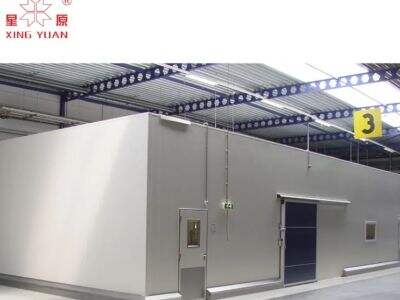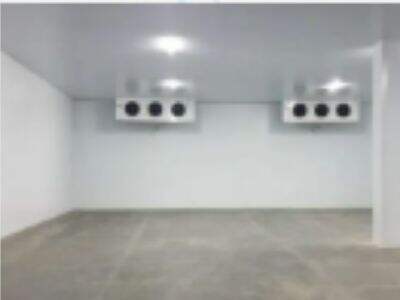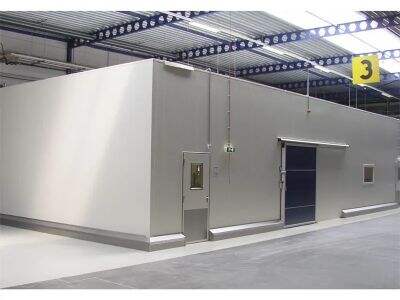לשמירת מזון, נדרשת פתרון אמין ויעיל המאפשר להמשיך למכור מוצרים באיכות הגבוהה לאורך זמן. אחד הפתרונות הנפוצים בכל תחומים הוא תא מקרור. מקררים אלו מעוצבים כדי לשמור על טמפרטורות נמוכות כדי להבטיח שمنتجات חד-קיפון כמו ירקות ופירות, חלב, בשרים ואחרים ישמרו בתנאי איכות טוב לתקופות ארוכות יותר. נלמד למה תאי מקרור מהווים פתרון קריטי לאחסון מזון לטווח ארוך, מהם היתרונות שלהם וכיצד הם עוזרים לעסקים לעמוד בהוראות ובהנחיות לבטיחות המזון
יתרונות שימוש בתא מקרור לאחסון מזון
לחדרי קירור מספר יתרונות כשמדובר באחסון מזון לתקופות ארוכות. יתרון מרכזי אחד הוא היכולת לשמור על טמפרטורה אחידה בכל אזור האיחסון, מה שפוגע בגדילה של חיידקים מזיקים ו פתוגנים שעלולים להרעיל את המזון. לחדרי קירור יש גם הרבה שטח אחסון, כך שעסקים יכולים לאחסן כמות גדולה של פריטים בני תוקף בצורה מסודרת. בנוסף, היותם גמישים מאוד אומרת שניתן להשתמש בחדרי קירור לאחסון טווח רחב של סחורות. ובנוסף, חדר קר הם פועלים בצורה יעילה יותר מבחינה אנרגטית, ולכן החיסכון בהצריכת החשמל הכולל ישתלם במהרה

פתרונות אחסון מזון זולים לאורך זמן
חדרים קרים לאחסון מזון לעומת יחידות קירור גדולות או מסורתיות הן יקרות מאוד להפעלה, ויקרות אפילו יותר לאורך זמן בגלל שתרצו לעבוד קשה יותר ממה שנחוץ כדי לשמור על המזון בטמפרטורות מסוימות. עם אחסון טוב יותר ובקרה על הטמפרטורה, מסעדות יכולות לצמצם משמעותית את בזבוז המזון והפסדי המלאי. הלוחות והדלתות של החדרים הקרים שלנו מיוצרים מחומרים עמידים, מה שמבטיח אורך חיים ארוך עם תחזוקה מינימלית או ללא תחזוקה, ולכן הם משתלמים לאורך זמן. יתר על כן, הגמישות של חדרים קרים מאפשרת לחברות לנצל את שטח האחסון בצורה הטובה ביותר, מבלי להתפשר על שטח ריבועי. בסופו של דבר, השקעה בחדר קירור לאחסון מזון יכולה להפוך לבחירה חכמה מבחינה כלכלית לאורך זמן עבור כל עסק בתעשיית המזון
למה חדרים קרים חיוניים לבטיחות ואיכות המזון
הצורך לתת עדיפות לבטיחות ואיכות המזון לאורך כל שרשרת האספקה הוא בעל חשיבות עליונה בשוק התחרותי של ימינו. חדרי קירור חיוניים בתהליך זה מכיוון שהם מציעים סביבה מתאימה המבטיחה שמלאי המזון יישאר טרי וישמור על ערכו התזונתי. טמפרטורה נכונה בדיוק - חדרי קירור מונעים צמיחה של עובש וחיידקים, ממזערים זיהום וקלקול. זה מאפשר לעסקים לדבוק בכללי ותקנות בטיחות המזון תוך הבטחה שמוצריהם יהיו באיכות המתאימה ובטוחים לצריכה אנושית. עסקים יכולים להיות סמוכים ובטוחים שפריטי המזון נשמרים בסביבה סניטרית עם חדרי קירור.

שמירה על טריות ותזונה הכלואות במזון שנשמר בתוך התאים
יציבות טמפרטורה ב חדרי קירוח הינו הכרחי לשמירה על טריות וערך תזונתי של מזון. על ידי קירור של מוצרים בני שימור לטמפרטורות מסוימות, מקפיאים עוצרים את תהליך ההתדרדרות הטבעי, ובכך יכולים להאריך את חיי המדף של מה שמאוחסן. זה חשוב במיוחד למוצרים בני שימור כמו פירות וירקות שאם לא יאוחסנו כראוי יש להם חיי מדף קצרים מאוד. יתר על כן, אחסון קירור גם שומר על הויטמינים והחומרים המזינים החשובים בתוך המזון, ומאפשר ללקוחות להפיק את המיטב מבריאותם על ידי צריכה של המוצרים האלה. מקומות איחסון קרים כמו חדרי קירור הם לפיכך חיוניים כדי לעזור לעסקים לספק תמידially מוצרים טריים ואיכותיים ללקוחותיהם
איך עסקים יכולים לחסוך עלויות באמצעות שימוש בחדרי קירור כדי לעמוד בכללי ובהנחיות הבטיחות המזון
בשוק המאוד מוסדר של מזון, חברות חייבות לעמוד בדרישות אכיפה ובהוראות מחמירות מאוד כדי להבטיח כי המזון באיכות גבוהה ובטוח. תאי קירור מהווים רכיב חשוב בהנגשת העסקים לעמוד בהנחיות אלו, על ידי סיפוק סביבה מבוקרת לשמירת מוצרים בני תפוגה. תאי קירור שומרים על טמפרטורה מבוקרת כדי למנוע את התפתחותם של חיידקים פתוגניים העלולים לגרום למזיקי מזון, וכן עוצרים את הגדילה של חיידקים היוצרים ריחות ובשמים לא נעימים בבשר. בנוסף להסכמה עם דרישות בטיחות המזון, פעילויות אלו מספקות הגנה לצרכנים מפני סיכוני בריאות הנובעים מאכילת מזון פגום או מזוהם. על ידי השקעה בתא קירור לאחסון מזון, חברות יכולות להפגין כי הן אמונות על שמירה על בטיחות המזון ועל סיפוק חומרי גלם באיכות ראשונה ללקוחותיהן
חדרי קירור וקירור מהווים חלק חשוב מאוד באחסון ארוך טווח של מזון במספר עסקים כשמדובר באחסון מוצרים בני שימור, הם יכולים להיות מאוד שימושיים ולשמור על אלפי דולרים. הסיכונים גבוהים - חדרי קירור מהווים חלק חיוני בהבטחת עמידה של עסקים בתקני בטיחות המזון ובתקנות, בזכות היכולת לשמור על הטמפרטורות הנכונות, לשמור על בטיחות המזון ולשמור על החידושיות והערך התזונתי של הפריטים האגורים. איחסון מזון חדר קר ההשקעה תחזיר את ערכה בכך שתעזור לעסקים להאריך את חיי המדף של המזון, לצמצם את בזבוז המזון ולשפר את ניהול הבקרה על האיכות, מה שיגרום לשיפור שביעות הרצון של הלקוחות, וכן לעידוד הרווחיות בقطاع המספק מזון
 EN
EN AR
AR BG
BG HR
HR CS
CS DA
DA NL
NL FR
FR DE
DE FI
FI EL
EL HI
HI IT
IT JA
JA KO
KO NO
NO PL
PL PT
PT RO
RO RU
RU ES
ES IW
IW ID
ID LT
LT SR
SR SK
SK LV
LV SL
SL ET
ET IS
IS LA
LA SV
SV UK
UK SQ
SQ GL
GL HU
HU TH
TH AF
AF CY
CY FA
FA
